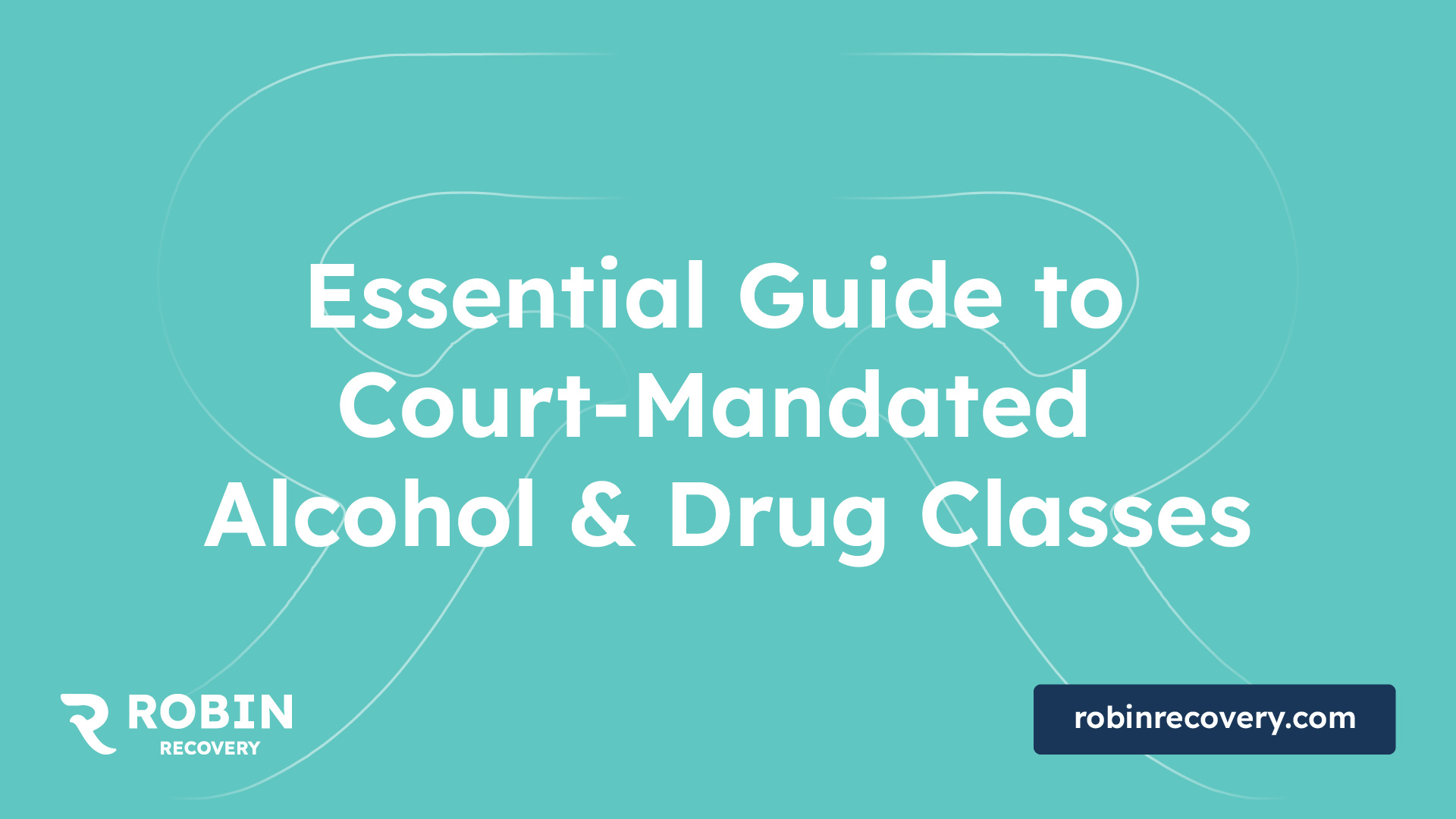Essential Guide to Court-Mandated Alcohol & Drug Classes

Understanding Court-Mandated Classes
Court-mandated alcohol and drug classes play a crucial role in addressing substance abuse and addiction issues. These programs are often a part of legal sentences or probation requirements.

Purpose of Court-Mandated Programs
The primary aim of court-mandated programs is to help individuals recover from substance abuse and prevent relapse. These classes provide participants with the knowledge, skills, and insights necessary for overcoming dependencies. By offering education and support, court-mandated classes enable individuals to understand the consequences of their actions and develop effective coping strategies. According to New Horizons Centers, these programs facilitate connections with others facing similar struggles, which can be a vital aspect of recovery.
Types of Alcohol & Drug Classes
There are various types of court-mandated alcohol and drug classes available. The specific program chosen often depends on the severity of the individual's substance abuse problems and the recommendations of court-appointed counselors or treatment professionals.
Class TypeDescriptionEducation ClassesFocus on providing information about substance abuse, its effects, and prevention strategies.Therapy SessionsOffer personal evaluation and treatment recommendations through individual or group therapy.Relapse PreventionTeach participants strategies to manage cravings and avoid circumstances that may lead to relapse.Support GroupsProvide peer support and sharing experiences among individuals facing similar challenges.
These varying class formats ensure that individuals can find the support they need based on their unique circumstances. For more details on specific programs, consider exploring our section on specific programs and offerings.
Understanding the framework and goals of these court-mandated classes is essential for those seeking to meet their legal obligations while working towards recovery.
Benefits of Court-Mandated Classes
Court-mandated alcohol and drug classes offer several advantages for individuals seeking help with substance use issues. These programs are designed not only to fulfill legal requirements but also to aid in education, support, and recovery.
Education and Support Offered
One of the primary benefits of these programs is the education they provide. Individuals learn about the consequences of their actions and gain insights into the nature of addiction. This understanding is crucial in developing the knowledge and skills necessary to overcome dependencies. Participants have the opportunity to connect with others facing similar struggles, allowing them to share experiences and build a support network. According to New Horizons Centers, these classes help participants develop coping strategies to manage cravings and stressors.
The structure of these classes encourages personal growth by providing a safe environment for individuals to confront their challenges. The curriculum often includes:
Topic CoveredDescriptionUnderstanding AddictionInformation on the physical and psychological aspects of addiction.Coping StrategiesTechniques for managing triggers and cravings.Consequences of Substance UseEducation on the risks associated with drug and alcohol use.
Focus on Prevention and Recovery
The focus of court-mandated classes extends beyond compliance with court orders. They emphasize prevention and recovery by equipping participants with the tools necessary to maintain sobriety. These programs address underlying issues contributing to substance abuse and foster skills for long-term success.
Participants engage in discussions that facilitate self-reflection and establish goals for recovery. This proactive approach helps individuals build resilience against relapse. Moreover, court-mandated classes are often structured to meet the varying needs of individuals based on the severity of their substance use problems, as noted by New Horizons Centers.
In addition to education, the convenience of these classes enhances their effectiveness. Most programs are available online, allowing individuals to complete sessions at their own pace using devices like computers and smartphones [1]. This flexibility supports continued learning while adhering to local public health guidelines.
Ultimately, court-mandated alcohol and drug classes play a significant role in helping individuals not just meet legal obligations but also in paving the way for meaningful recovery and personal transformation. For more insights on navigating the recovery journey, consider exploring topics related to ways to take care of your mental health and the importance of sleep during recovery.
Importance of Compliance
Compliance with court-mandated alcohol and drug classes is a critical component for individuals working towards recovery. Understanding the implications of non-compliance and recognizing the commitment to personal growth are essential for anyone involved in these programs.
Consequences of Non-Compliance
Failing to complete court-mandated programs can lead to serious repercussions. Individuals may face various legal consequences, which could include:
ConsequencesDescriptionExtended Jail TimeNon-compliance may result in additional imprisonment.Increased FinesFailure to attend classes can lead to larger financial penalties.License SuspensionIndividuals may lose their driving privileges, impacting mobility.Probation ViolationsNon-compliance can jeopardize any probation arrangements in place.Arrest WarrantsContinuous failure to comply may result in active warrants for arrest.
These repercussions highlight the importance of fulfilling court-mandated requirements, not only to avoid legal issues but also as part of a person's recovery journey. For more detailed insights, visit Dover Recovery for additional information on the consequences of non-compliance.
Commitment to Personal Growth
Completing court-mandated classes demonstrates a firm commitment to personal growth and recovery. It is more than just fulfilling a legal obligation; it is an opportunity for individuals to learn about addiction, develop coping strategies, and receive support from professionals and peers. Engaging wholeheartedly in these programs can lead to transformative changes in an individual’s life.
Additionally, individuals can focus on:
By prioritizing compliance and actively participating in the program, individuals not only comply with court mandates but also take significant steps towards improving their life, enhancing their mental health, and avoiding further complications in their recovery journey. For more strategies on personal well-being, check out our article on ways to take care of your mental health.
Specific Programs and Offerings
Court-mandated alcohol and drug classes can vary by location and the specific circumstances of the individual's case. This section will explore specific programs available, with a focus on the Virginia Alcohol Safety Action Program (VASAP) and DUI treatment programs.
Virginia Alcohol Safety Action Program (VASAP)
The Virginia Alcohol Safety Action Program (VASAP) is a notable program for individuals charged with DUI offenses in Virginia. It consists of alcohol education classes, treatment, and ongoing monitoring for alcohol and drug use. The primary goal of VASAP is to prevent future DUI offenses by addressing issues surrounding alcohol and drug abuse through comprehensive educational and treatment programs [2].
The program includes:
The structured nature of VASAP helps participants understand the underlying issues of their substance use and supports them in their journey toward recovery.
DUI Treatment Programs
In addition to VASAP, different states may offer specific DUI treatment programs aimed at individuals facing legal consequences due to driving under the influence of alcohol or drugs. These programs usually encompass various elements designed to educate and rehabilitate participants:
Program ComponentDescriptionClassroom EducationA mandatory series of classes that cover the dangers of substance use and driving, as well as relevant laws.Therapy SessionsIndividual or group therapy sessions focusing on addiction recovery and coping mechanisms.Assessment and MonitoringEvaluation of the participant's substance use history, followed by regular check-ins to ensure compliance and monitoring of recovery progress.
These treatment programs are typically structured according to national standards and approved by organizations such as the National Association of Drug Court Professionals [1]. They aim to reduce recidivism and promote healthier choices among participants.
For anyone looking for resources on mental health, it is also worth exploring ways to take care of your mental health in conjunction with these programs. Recovery from addiction is a multifaceted journey that often requires holistic support and understanding.
Accessing Alcohol & Drug Classes
Convenient Online Options
Accessing alcohol and drug classes has become easier with the availability of online options. These classes are designed to be extremely convenient, available 24 hours a day, 7 days a week. Individuals can complete their courses using various devices, including desktop computers, laptops, tablets, or smartphones. This flexibility supports remote learning and social distancing, which is especially important in the context of ongoing health concerns related to the COVID-19 pandemic [1].
Class LengthTypical Completion TimePrice Range4-hour4 hours$24 - $758-hour8 hours$48 - $10012-hour12 hours$72 - $12516-hour16 hours$96 - $15024-hour24 hours$120 - $195
The court will typically determine the required length of the class based on the specific offense committed. Participants can use an online timer to keep track of their hours, making the process straightforward and manageable.
Cost and Certificate of Completion
The cost of alcohol and drug awareness classes can vary significantly based on the length of the course. Prices generally range from $24 for shorter classes to $195 for longer ones [1]. Once individuals complete their courses, they receive a certificate of completion, which is sent directly to their email. This certificate serves as proof of completion and can be easily forwarded to the court or any relevant authority requesting documentation.
For many, understanding the logistics of these programs is a key part of navigating the requirements of court-mandated alcohol and drug classes. Participants should feel empowered knowing they have access to flexible options that cater to their schedules while ensuring they meet their legal obligations.
Impact and Effectiveness
Positive Influence on Recovery
Court-mandated alcohol and drug classes serve as a critical component in the recovery journey for many individuals. These programs not only provide essential educational resources, but they also foster a sense of accountability. Through structured sessions, participants learn about the consequences of substance use and the strategies necessary for sustainable recovery.
Research indicates that there is a modest but positive effect on decreasing issues related to drinking and driving among those mandated to undergo treatment. Specifically, DUI offenders who engage in court-ordered interventions demonstrate a notable reduction in alcohol-impaired accidents as they acquire better coping mechanisms and understanding of their behaviors [3].
Study OutcomeEffectivenessReduction in drinking-driving incidentsPositiveDecrease in alcohol-impaired crashesModest
Research and Outcomes
Various studies highlight the effectiveness of court-mandated programs in promoting recovery. Participants in these classes report improvements in their understanding of addiction, enhanced coping skills, and a greater commitment to personal growth. The structured environment offered by these programs plays a significant role in motivating individuals to participate actively in their recovery process.
Ongoing research shows a link between attendance in court-mandated classes and better long-term outcomes for participants, contributing to a decrease in recidivism rates associated with substance-related offenses. The combination of education, peer support, and accountability leads to healthier lifestyle choices and fosters a commitment to sobriety.
Individuals seeking to improve their mental health can also explore ways to take care of your mental health as they progress through their recovery. Overall, court-mandated alcohol and drug classes provide essential frameworks that aid in the transition to a safer, more responsible lifestyle.
References
[2]:
[3]:
